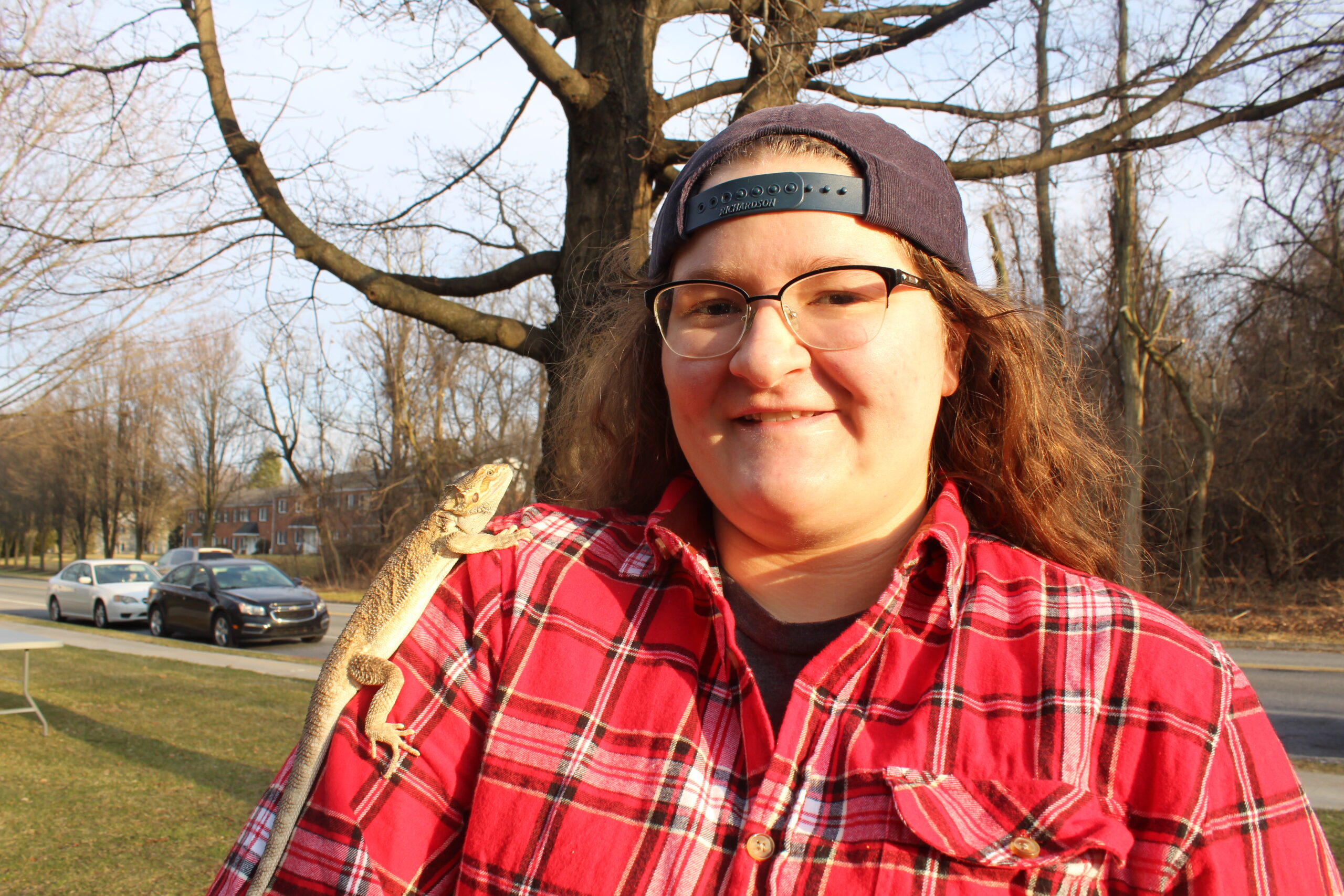An unusual pet tale
Bearded dragon provides student with emotional support

By Jenelle Dulack
Knightly News Reporter
jenelle.dulack@mymail.centralpenn.edu
Central Penn student Jennifer Molter is the epitome of an animal lover.
Her home in Palmyra is filled with furry and feathery friends: YeeYee, Humphrey and Cheese, the chickens; Jax, the family dog: Funk, the fish; Amethyst and Zeffer, the guinea pigs; Thor and Finn, the cats; and Daisy and Remy, her sister’s dogs.
None of this includes her daily interaction with animals as a Tractor Supply employee.
The newest addition to the Molter family is Molter’s emotional-support pet, Spyro the bearded dragon.
Permission for pets
At Central Penn College, students with qualifying conditions may ask Dean of Equity and Multicultural Affairs Megan Peterson for clearance for a service animal or emotional-support pet to live on campus. Molter has struggled with anxiety and depression in the past, and felt she would benefit from adopting an emotional-support animal for herself in October 2021.
“I have struggled so much with depression, so I feel like, for Spyro, taking care of him is taking care of me,” she said.

When most people picture an emotional-support pet, the animals that first come to mind are most likely a dog or a cat. Molter was inspired to get a bearded dragon as her companion after seeing her sister raise a bearded dragon of her own. Molter headed down to McCracken’s Pet Food & Supply, in Elizabethtown, every day after seeing baby bearded dragons arrive in the shop. Influenced by one of her first PlayStation videogames, Spyro, she bestowed upon her new bearded dragon the title that had become so sentimental to her.
Bond forms
Now, six months into raising her newest pet, Molter and Spyro have developed a particularly strong bond. On days when Molter’s anxiety gets the best of her, Spyro can be heard scratching on the glass of his tank. From her perspective, Molter feels as though Spyro can sense when she is in dire need of comfort. The two can be found in her free time lying in bed enjoying the calm and resting. Molter pets him until she falls asleep or until Spyro has finished watching his favorite show on Netflix, “Scooby-Doo.”
When Spyro became a new addition to Molter’s life, lots of research was required to properly cater to his needs.
“I think people need to have the knowledge and do the research about owning reptiles,” Molter said. “People don’t know how to take care of them properly.”
Caretaking challenges
As part of being the ideal caretaker, she discovered many of the potential challenges to owning an exotic pet, especially in the climate and tank in which her pet resides.
First, she made sure that her scaly friend had a warm basking spot and an ultraviolet b (UVB)-light lamp. These are necessary for bearded dragons, as these cold-blooded animals need at least a simulation of an Australian sun. The ultraviolet b ray, part of sunshine, helps bearded dragons produce vitamin D3, which allows them, and other reptiles, to absorb calcium properly, according to Petco.com.
When feeding Spyro, Molter considers his size and age. Because he’s not fully grown, his diet contains 50 percent greens (mostly cilantro) and 50 percent insects (mostly mealworms). During his feeding time, she makes sure to address a common issue that arises while owning a bearded dragon. During the later years of their 10-year lifespan, these animals are likely to develop a calcium deficiency, causing their already brittle bones to become deformed. To prevent this, Spyro is fed extra servings of calcium powder, on top of his main course.
Another measure Molter made sure to be aware of is a condition called impaction, in which reptiles may eat their bedding, causing it to get stuck in their stomach, unable to be digested. By using a substrate — the material on the bottom of a reptile’s tank — such as paper towels, the possibility of him eating bedding and getting sick is extremely low. When she can afford to, Molter plans to get Spyro a bioactive tank with live plants, and with sand and clay as his substrate.
Because Spyro does not qualify to be a service animal, Molter is unable to take her pet with her to class, other dorms or any other location outside her home that may be stress-inducing.
“I’d have a leash for him if I could,” Molter said. “If not, he could just sit on my shoulder and he wouldn’t move at all. I wish I could carry him around everywhere.”
Due to the nature of her pet, much of her attention lands on Spyro, but Molter doesn’t mind. She sees taking care of him as an extension to caring for herself. In return, Spyro snuggles her worries away and allows Molter to direct her extra energy toward something she loves.
“I look at him and think, I need to take care of you because, without me, you can’t survive, either,’” she said.
Dulack is president of The Knightly News Media Club.
Comment or story idea? Contact KnightlyEditors@CentralPenn.Edu.
Edited by media-club co-adviser and blog editor Professor Michael Lear-Olimpi.



